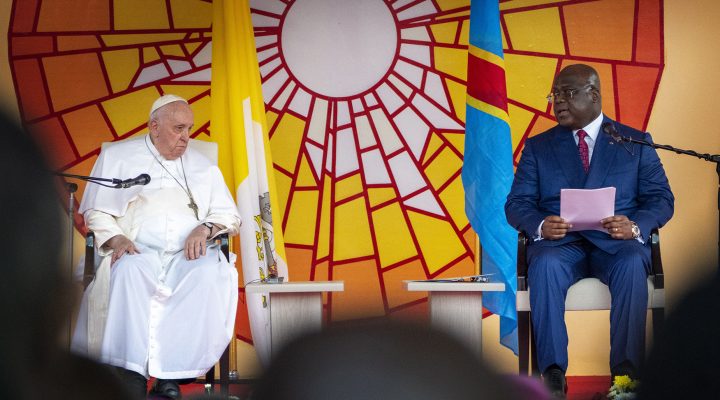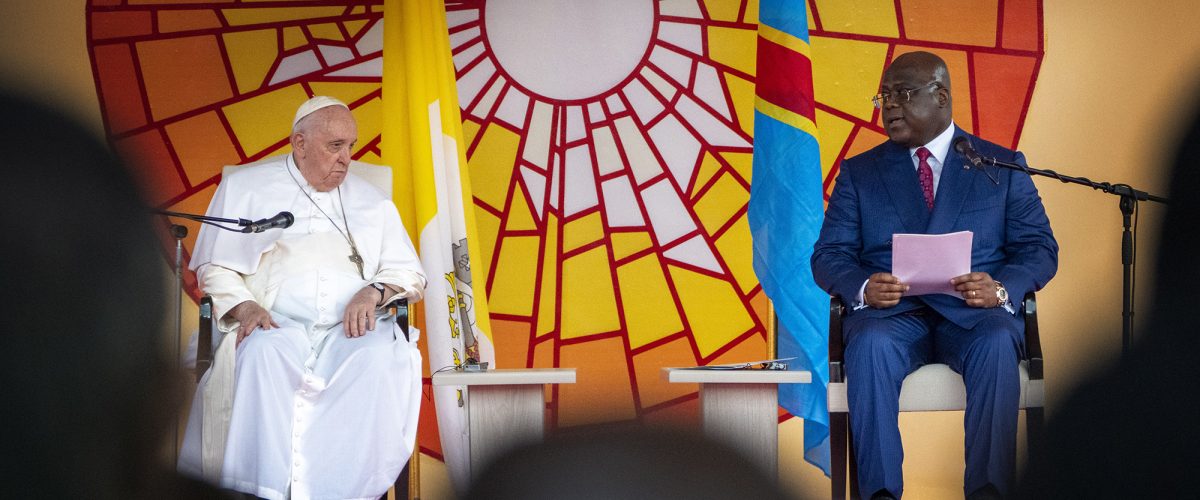Pope Francis arrived in Democratic Republic of Congo today, marking the first papal visit to the African nation since John Paul visited there in 1985 when the country was known as Zaire. This is the beginning of a six-day, two-nation trip by Pope Francis.
About half the 90 million residents of Congo are Roman Catholic.
Both Congo and South Sudan share something deadly in common. Both have been plagued in recent years by conflict and insecurity caused by warring or rebel groups. For the last decade, this has resulted in misery, countless deaths and destruction of property.
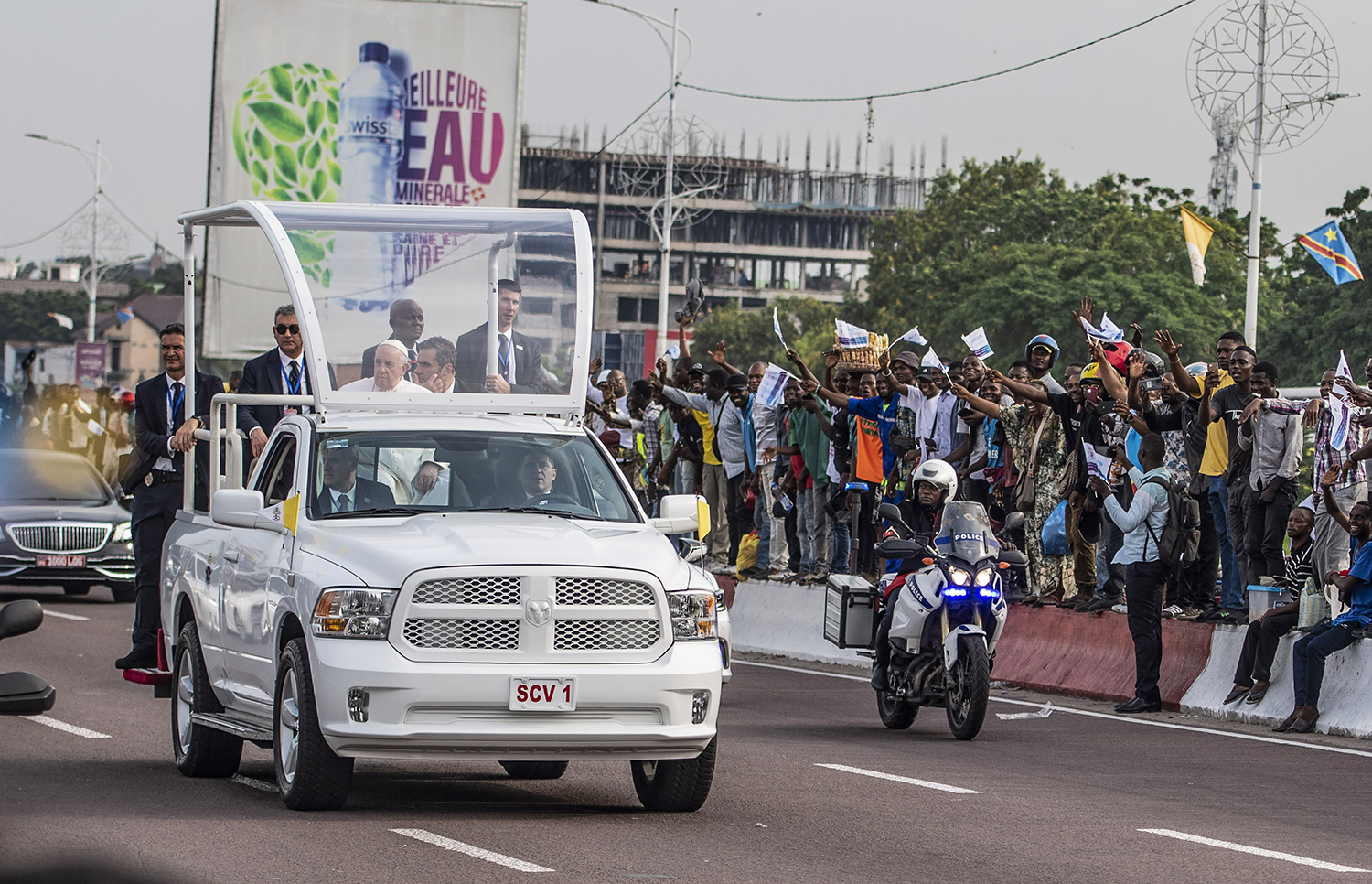
Pope Francis greets well-wishers after arriving in Kinshasa, Congo, Tuesday Jan. 31, 2023. Francis is in Congo and South Sudan for a six-day trip, hoping to bring comfort and encouragement to two countries that have been riven by poverty, conflicts and what he calls a “colonialist mentality” that has exploited Africa for centuries. (AP Photo/Moses Sawasawa)
A 48-page report by the United Nations Commission on Human Rights in South Sudan last year describes “a hellish existence for women and girls,” as “widespread rape is being perpetrated by all armed groups across the country, often as part of military tactics for which government and military leaders are responsible.”
A 2022 Amnesty International report on DRC said “continuing armed conflict and violence claimed thousands of lives, large-scale displacement and widespread sexual violence” and “indiscriminate attacks against civilian populations, looting and destruction of homes, crops, and other objects indispensable for the survival of the civilian population, as well as attacks on infrastructure, continued particularly in the east and south.”
Some of these horrors “constituted war crimes,” the report said.
Pope Francis is expected to use his influence to call warring factions to the negotiating table.
Pope Francis is expected to use his influence to call warring factions to the negotiating table. He is expected to preach peace and to unite people of various ethnic and religious groups.
This is a familiar role for Francis. In April 2019, South Sudan’s warring leaders, President Salva Kiir and his deputy, Rick Machar, visited the Vatican, and Francis knelt and kissed their feet. The pope urged the warriors to embrace peace, but no sooner had they left the Vatican than they and their supporters returned to their violent ways and peace accords were breached.
Francis intended to make this trip seven months ago but had to delay due to a knee problem.
Just weeks ago, in his New Year’s message at St Peter’s Basilica, Pope Francis highlighted the need for peace. He prayed for “sons and daughters who are suffering and no longer have the strength to pray, and for our many brothers and sisters throughout the world who are victims of war, passing these holidays in darkness and cold, in poverty and fear, immersed in violence and indifference.”
He is joined in the current trip by two other prominent religious leaders — the Archbishop of Canterbury, Justin Welby and the moderator of the Church of Scotland, Iain Greenshields.
This is the third time Francis has visited Africa.
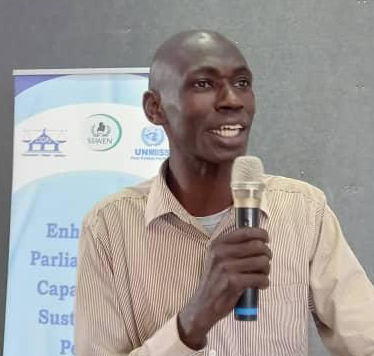
Edmund Yakani
Edmund Yakani, a South Sudanese activist, said he hopes peace will be realized as a fruit of the visit.
“Yes, I have expectations specifically around the conflicting parties,” he said. “I wish for the pope’s call for peace and stability to prevail for the common good of the citizens. I hope the violence scale reduces after the pope’s visit. My dream is that Pope Francis’ and the other two Christian leaders’ visit will cultivate political attitudes toward violence reduction and respect of peaceful political power transfer.”
Yakani’s optimism is in spite of what he knows about the history of violence in South Sudan and DRC and those fueling the crisis in both places.
“The leaders of the conflicting parties are more interested in power and resource control. The leaders of the parties in both countries are profiteers of the violence,” he said.
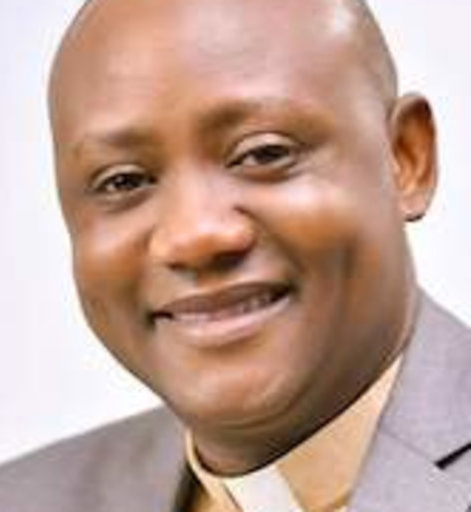
Justine John Dyikuk
Justine John Dyikuk, a Catholic priest and Ph.D. student at the University of Strathclyde in Glasgow, Scotland, explained the importance of the pope’s visit.
“Both the Democratic Republic of Congo and South Sudan are Christian countries grappling with abject poverty and conflict,” said Dyikuk, who’s also a senior fellow for religious freedom policy at the Religious Freedom Institute. “It is crucial to note that Congo is home to 45 million Roman Catholics, the faith’s largest community in Africa, where the church runs about 40% of the nation’s health facilities and provides education to about 6 million children in Catholic schools.”
The pope’s visit is crucial as it could help “call the attention of the world to long decades conflicts of these mineral-rich nations which have been wrecked by long-decades of senseless violence that has sent millions to their early graves,” he said.
The Nigerian priest is confident “this high-powered visit would bring hope and unity to the two nations as well as the continent.”
Yet as past examples in Africa and elsewhere have shown, maintaining peace after the cameras are off is a challenge. Beyond Pope Francis’ mediation efforts, Dyikuk believes religious leaders have a responsibility to work for peace in their communities.
“Religious leaders must embrace peace building, live by its principles and teach the same to their adherents,” he said. “We have examples of Archbishop Desmond Tutu in South Africa and Mahatma Gandhi in India who exemplified tolerance, respect for the other person’s creed and coexistence. In Nigeria, for instance, we have the likes of Bishop Matthew Hassan Kukah and Imam Abdullahi Abubakar, who saved hundreds of Christians during an attack from suspected Fulani herdsmen in Plateau State on June 23, 2018.”
“Religious leaders must embrace peace building, live by its principles and teach the same to their adherents.”
In view of the ethnic and religious diversity of Africa, Dyikuk contends people must accommodate and appreciate their differences and eschew all manner of hate.
“Diversity should never be a problem; if anything, it should be a blessing,” he said. “Is there any country that is as diverse as the United States of America? How many conflicts are they experiencing there? Well, I think religious leaders across Africa should see the continent’s diversity as a source of strength and synergize with civil authorities to eschew violence and build bridges of peace.
“I (would love to) see a future where religious (leaders) act as stakeholders who incubate a new brand of youth who are global leaders that relate with one another on the basis of humanity, competence and the spirit of ubuntu (communitarian love),” he said. “I anticipate a future where religious leaders would not collude with political-buccaneers to plunder resources, connive with external powers to steal resources or divert resources to foreign bank accounts. An Africa devoid of conflict and bloodshed.”
Anthony Akaeze is a Nigerian-born freelance journalist who lives in Houston. He covers Africa for BNG.

